The Siliconvallean Candidates
Thoughts inspired by last spring's NAS workshop on AI and mathematical reasoning
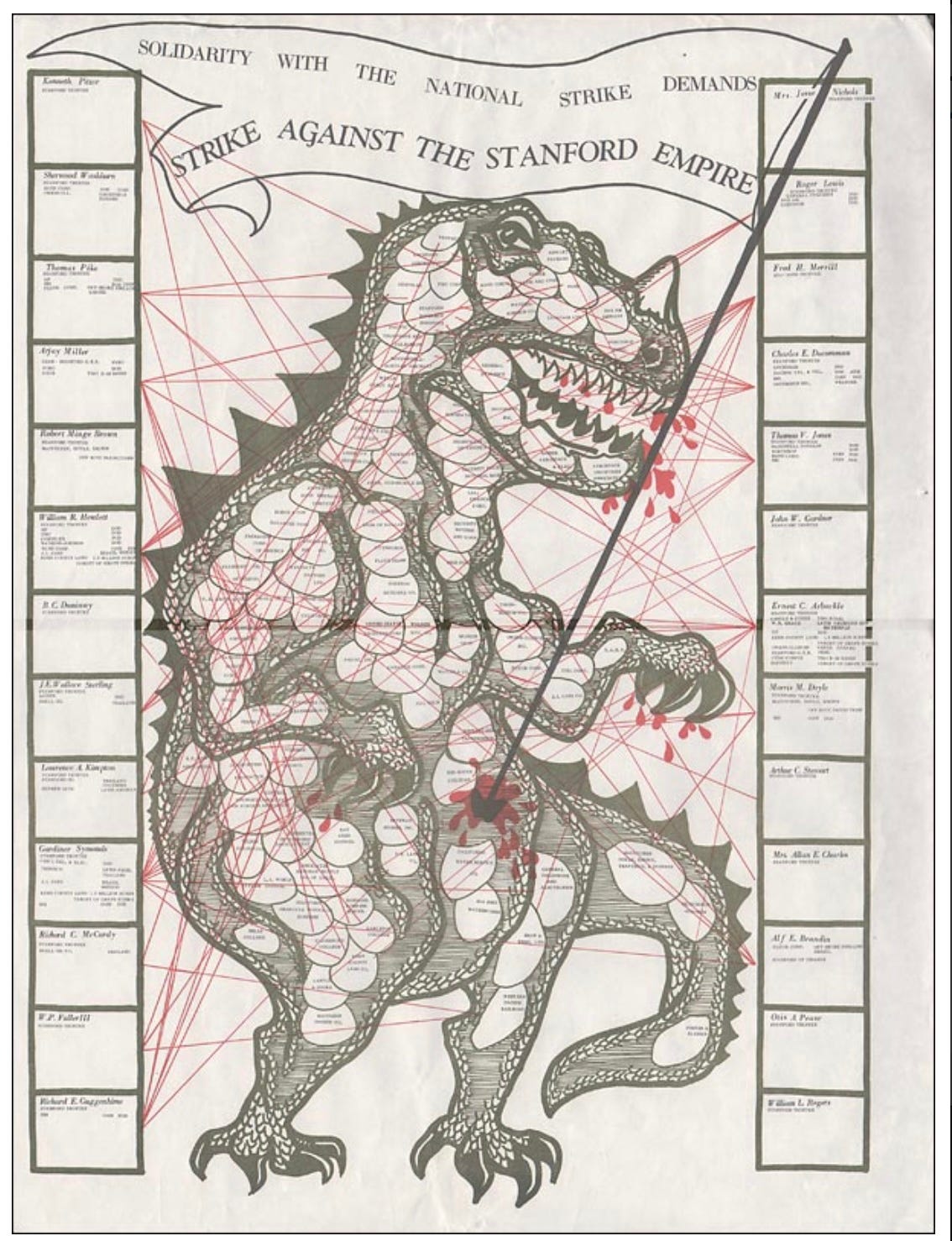
The seductive appeal of the serial offender
…he operated in a gray area between industry, organized crime, and the security state—no wonder he ended up in Palo Alto. (Malcolm Harris, Palo Alto, p. 298)
Malcolm Harris’s monumental Palo Alto, which I expect to be quoting frequently in the coming months, casts the city itself, along with its surrounding Valley and its resident University, as a serial offender against democracy, accountability, social justice, and common sense, ever since California became part of the United States. Interestingly, it attributes much of the ethos we have come to associate with Silicon Valley to the persistent influence of the immortal Herbert Hoover, one of Stanford’s first and most memorable alumni.
Though it is only a seven minute walk from the Hoover Institution, Stanford’s mathematics department seems to have escaped both the literal and figurative shadow of its 285-foot tower, and my colleagues in the department — at least those I know — are not to be held responsible for any structures operating in that gray area between industry, organized crime, and the security state. But are they — and all the rest of us — perhaps unwitting accomplices to these structures? How much of mathematics has been brainwashed into taking its marching orders from that gray area?
These are the questions I ask myself every time I remember that, in the very first post on Silicon Reckoner, I announced that it would be largely devoted to
exploring the reasons for the absence of any sustained discussion of these issues on the part of mathematicians, in contrast to the very visible public debate about the perils and promises of AI.
“These issues” refers, among other things, to
how the words and power behind AI and their interrelations are shaping the future of my vocation and its values
More than three years later, mathematicians have yet to begin such a sustained discussion, even while increasing numbers of us are routinely co-authoring papers with researchers at Silicon Valley firms and sitting on panels alongside their representatives. All this is taking place while these same firms are being unmasked, and occasionally sanctioned, as serial offenders against antitrust legislation (also here), tax law, and truth.
Laws, some readers may object, can also be unjust; or, even if the investors who pull the strings in Silicon Valley are rarely1 confused with Thoreau or Gandhi, libertarians can argue that enforcement of antitrust law is “out of step with a high-tech economy.” But the law is not the only target of the tech industry’s offensive strategies. In her forthcoming book, Irina Kalinka explains how “tech-corporations design and promote their own normative conceptualization of democracy” — she calls it “User Democracy,” the title of her book. Her first chapter’s subtitle — “Dreams of escaping from the problem of the political” — could serve to label the international mathematical community’s failure thus far to challenge the industry’s AI narrative, a failure that has not been interrupted by the series of meetings under the auspices of the National Academies of Science, Engineering, and Medicine, including the one on which I report below.
And Malcolm Harris’s book serves as a reminder that serial offending has been a local specialty since long before anyone suspected that its silicon would be incomparably more valuable than the gold that first made California a prime destination for international settlers. Where else but in Palo Alto, site of the notorious Stanford Prison Experiment, would you expect to find a laboratory devoted to Behavior Design2?
The 2023 Presidential Election
Take a look at the list of past Presidents of the American Mathematical Society. If you are a mathematician, you will recognize nearly all the names, especially those elected since the Second World War. This is because, without exception, they are all extremely distinguished mathematicians. Is this why they were elected?
Undoubtedly their scientific achievements contributed to the name recognition so important in other electoral contests. But does mathematical distinction necessarily guarantee the skills needed to preside democratically over a complex organization? The question points to the “problem of the political” at the heart of democratic decision-making. Maybe every (adult?) member of a hunter-gatherer society can successfully carry out all tasks needed for the society’s survival. But contemporary life is not so simple. Opinions were already divided at the time of classical Athens:
those who directed the state in the time of Solon and Cleisthenes… considered that this way of appointing magistrates [selecting the best and the ablest for each function of the state] was also more democratic than the casting of lots, since under the plan of election by lot chance would decide the issue and the partizans of oligarchy would often get the offices; whereas under the plan of selecting the worthiest men, the people would have in their hands the power to choose those who were most attached to the existing constitution.3
Free male citizens of Athens selected their magistrates by lot during the classical period, but Plutarch’s Lives name-checked few of these magistrates; most are lost to history.
Does the mathematical community, or perhaps the AMS, look to you like a band of hunter-gatherers? However you choose to answer the question, you will not be surprised that the nominating letters for Christopher Hacon and Ravi Vakil, the two candidates for AMS President in 2023, were mainly devoted to reports on their scientific research — almost exclusively, in Hacon’s case. The AMS Notices published candidate biographies that also highlighted the candidates’ research accomplishments and awards, though these were bracketed by brief accounts of their service to the AMS at one end and to the profession at the other, followed by 400-word statements in which the candidates proclaimed their values and gave a hint of the priorities they would follow as President. For example:
Our profession is rapidly evolving whether we like it or not, and we should drive those changes and not just react.
“We” refers specifically to the membership of the AMS, but I chose to read the sentence to be an invitation to the international mathematical community as a whole to play the decisive role in determining the future of our profession. This sentiment has in one way or another motivated everything I have written in this newsletter. You would think, in fact, that a “sustained discussion” of “how the words and power behind AI and their interrelations are shaping the future” of mathematics and its values would be a prerequisite to driving as opposed to reacting to changes directed by the aforementioned gray area. And since the sentence is a direct quote from Vakil’s Candidate Statement, it was enough to decide my vote; Hacon’s own statement, admirable though it was, contained no similar sentence.
However, I can’t help noticing Silicon Valley’s presence on both tickets. Stanford Professor Vakil, of course, makes his home smack in the middle of the Valley. But while Hacon is, physically speaking, at a safe distance, his role in soliciting nominations for the Breakthrough Prize in Mathematics — in each of the past four years he has sent me a message whose first sentence invites me to
nominate outstanding individuals for the … mathematics prizes from the Breakthrough Prize Foundation.
— makes him a front man for Silicon Valley’s ongoing effort at Behavior Design in the sciences. While the Breakthrough Prize Foundation has backed off from its initial ambition to turn scientists into rock stars, it has successfully insinuated itself, through its sheer economic power, into the process of designating “outstanding individuals” among scientists.
More ominously, though, the seductive appeal of its vision of future humanity, amplified by its ubiquity in the media narrative, means that, whether or not future AMS presidential candidates are formally associated with the tech industry, it is the industry narrative that will continue to dominate the conversation about the future of collaboration between mathematics and machines, unless mathematicians are able to articulate a forceful alternative vision.
The April NAS Workshop
Even as I was writing this page, the New York Times published an op-ed that painted the tech industry as a serial offender against the public trust:
The United States’ current arrangement of managing A.I. risks through voluntary commitments places enormous trust in the companies developing this potentially dangerous technology. Unfortunately, the industry in general … has shown itself to be unworthy of that trust, time and again.
Vakil, whom I have never met, was elected AMS President in 2023, and I believe his term begins in January 2025. It may or may not have been in his capacity as AMS President-elect that he was invited to join the tech industry, in the person of Lior Horesh, Senior Manager of the Mathematics of AI group at IBM Research, for a one-hour webinar billed as a “follow-on discussion” of the workshop held in 2023 by the National Academies of Science, Engineering, and Medicine, on which Silicon Reckoner reported at length last summer.4 Or he may have been invited because he has expressed interest (though not in his Candidate Statement) in the “future of collaboration” (the topic and title of his webinar session) between “communities grounded in both mathematics and computer science” (to quote the session’s blurb).
Whatever the circumstances of his invitation, it’s clear from his presentation that he has thought deeply about the topic. In contrast to mathematicians who spoke at the 2023 workshop, Vakil rejected the IBM manager’s explicitly productivist model,5 as exemplified by this hairy image from Horesh’s presentation:
Rather, from the very beginning of his remarks Vakil stressed that “mathematics is not just about truth but is very much about understanding.” Understanding is the kind of “outcome” which, unsurprisingly, Horesh’s slide completely ignores. Later, deriving “lessons and questions” from the history of AI solution of games, he reiterates his priorities:
“I don’t just want to know that it’s a solved game. I want understanding, I don’t want perfect understanding, I want good understanding.”6
A series of Vakil’s slides invited his audience to “think about the ways” technology “has transformed how we do mathematics.” This emphasis on the material underpinnings of mathematics is extremely welcome, but I would take issue with the suggestion that either “mathematics” or the “we” has remained identical to itself under the onslaught of the transformation of the “doing.” Technological “advances,” for the President-Elect, have in common that
they have all sped up our collective human brain, our ability to do mathematics collectively, and whenever that has increased that’s when mathematics has accelerated.7
I was feeling an intense sense of relief by the time I reached this point in Vakil’s presentation. Although most of this post is devoted to my disagreements with some of his positions, among the mathematicians who have taken part in these NAS exchanges Vakil was the first to express coherent positions at all.8 This means not only saying what he thinks but also recognizing that there are alternative ways of thinking, and indeed that thinking as such is relevant to participating in the conversation. By the same token, he was the first of the mathematicians in this process who clearly outclassed the computer scientist with whom he shared the stage; as I reported at the time, the opposite was generally the case in the 2023 workshop, where the computer scientists contributed practically all the critical thinking.
Now I can begin to review our disagreements. For Vakil, the Liquid Tensor Experiment was “truly dramatic,” something he would not have believed possible; — his slide proclaims that “a Rubicon has been crossed.” He lists six reasons for this bold opinion. The most convincing of these is the fourth: that the formalization by Commelin and Topaz provided authentically mathematical insight.
My own opinion of the Liquid Tensor Experiment hasn’t changed since I wrote this essay. Since I had to self-publish the essay, my opinion of the range of opinion considered acceptable by official outlets — whether or not they are under the sway of serial offenders — has also not changed. The end of my essay contains a promise to “devote a future text to how and under what circumstances I might find myself feeling” positive about formalization. More than three years have passed and I have yet to keep that promise, but the “circumstances” would have to involve something like Vakil’s fourth reason. I’ve indicated elsewhere that Formalizing Fermat will not meet the threshold, so I am also grateful to Vakil for agreeing that “much of the mathematical community … needn’t and shouldn’t” appreciate such efforts.
The unfortunate tendency to view humans as a “resource”
Toward the end of his talk, and in connection with the relative strengths and weaknesses of LLMs vs. formalization, Vakil states that “the negative” aspect of the latter “is that it’s done by humans and humans are an expensive resource.” Those living in the shadow of Hoover Tower are trained to talk that way. But Vakil deserves no blame, since, as Malcolm Harris forces us to recognize, we’re all living in that shadow. Meredith Whittaker, President of the Signal Foundation, reminds us of what it will take to escape its darkness. When a Financial Times journalist asks Whittaker
if she sees any potential for the AI systems we are building now to have a positive impact,
she turns the question around:
“Not without radical social change,” she says — a restructure that would disrupt the economic forces around AI and the handful of private companies that currently control it, but also one that prioritises social goals over revenue and growth.9
For mathematics this translates into prioritizing understanding over “outcomes.” So let me give Vakil the last word on priorities:
Formerly the Persuasive Technology Laboratory.
Isocrates, Areopagiticus, George Norlin, Ed., www.perseus.tufts.edu.
And all through June, July, and August 2023.
Although I have no time to report on Horesh’s presentation, I do want to mention that one of his first slides is headed by this timely reminder that more is at stake than the matters to which mathematicians choose to devote their attention:
Recent studies suggest that the rate of emergence of new discoveries and their respective contribution to economic growth has been stagnating relative to the amount of capital investment.
As the slide “WHAT IS A MATHEMATICIAN?” illustrates, there is concern in high places that mathematicians have stagnated in their production of “outcomes.” But IBM research has an algorithm for that!
Vakil takes “heuristics” as one index of understanding. Compare this to my proposal that:
the goal of mathematics is to convert rigorous proofs to heuristics
and Terry Tao’s suggestion that
The ideal state to reach is when every heuristic argument naturally suggests its rigorous counterpart, and vice versa. Then you will be able to tackle maths problems by using both halves of your brain at once…
Here I have to confess that Palo Alto has been home to serious scholars as well as serial offenders. Those of the “Stanford School” of philosophy of science, as well as the Program in Science, Technology, and Society, in particular, have strongly influenced my own thinking about such questions. Thus — and I believe my ideas are consistent with those of the “Stanford Disunity Mafia” — I am constitutionally disinclined to believe that the self-identity of mathematics is preserved through technological transformation. I recognize that not all my colleagues will agree with this position — but I hope they in turn recognize, as Vakil seems to, that it is a legitimate option.
His slide on “Aspects of mathematical intelligence” is particularly insightful.




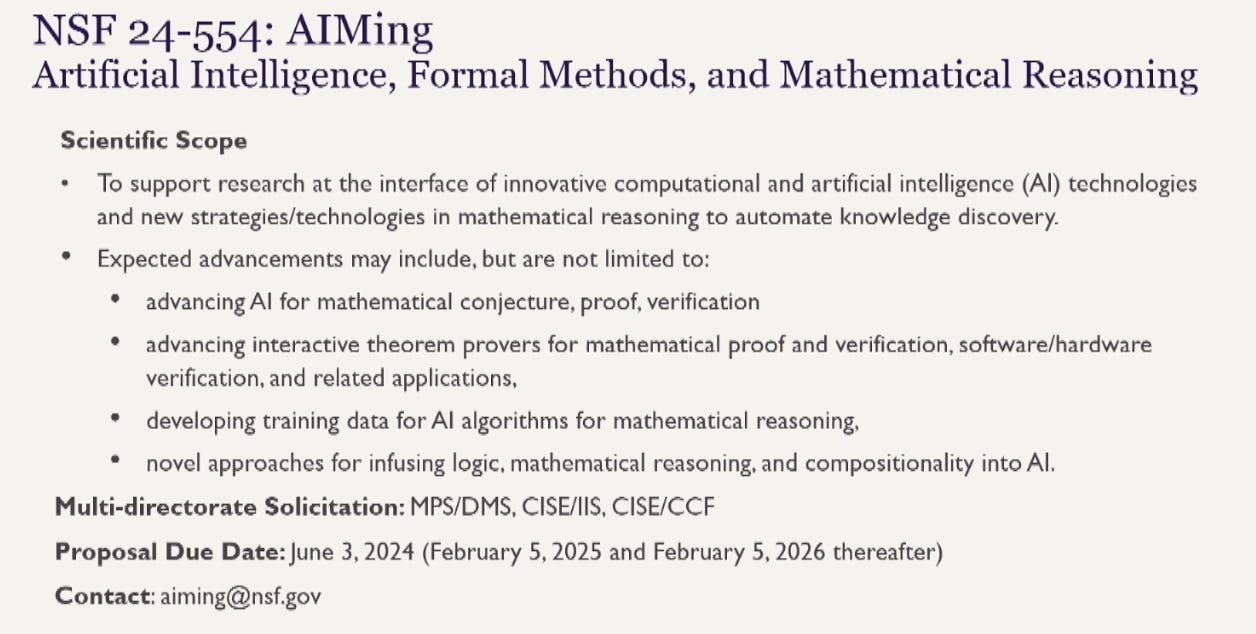
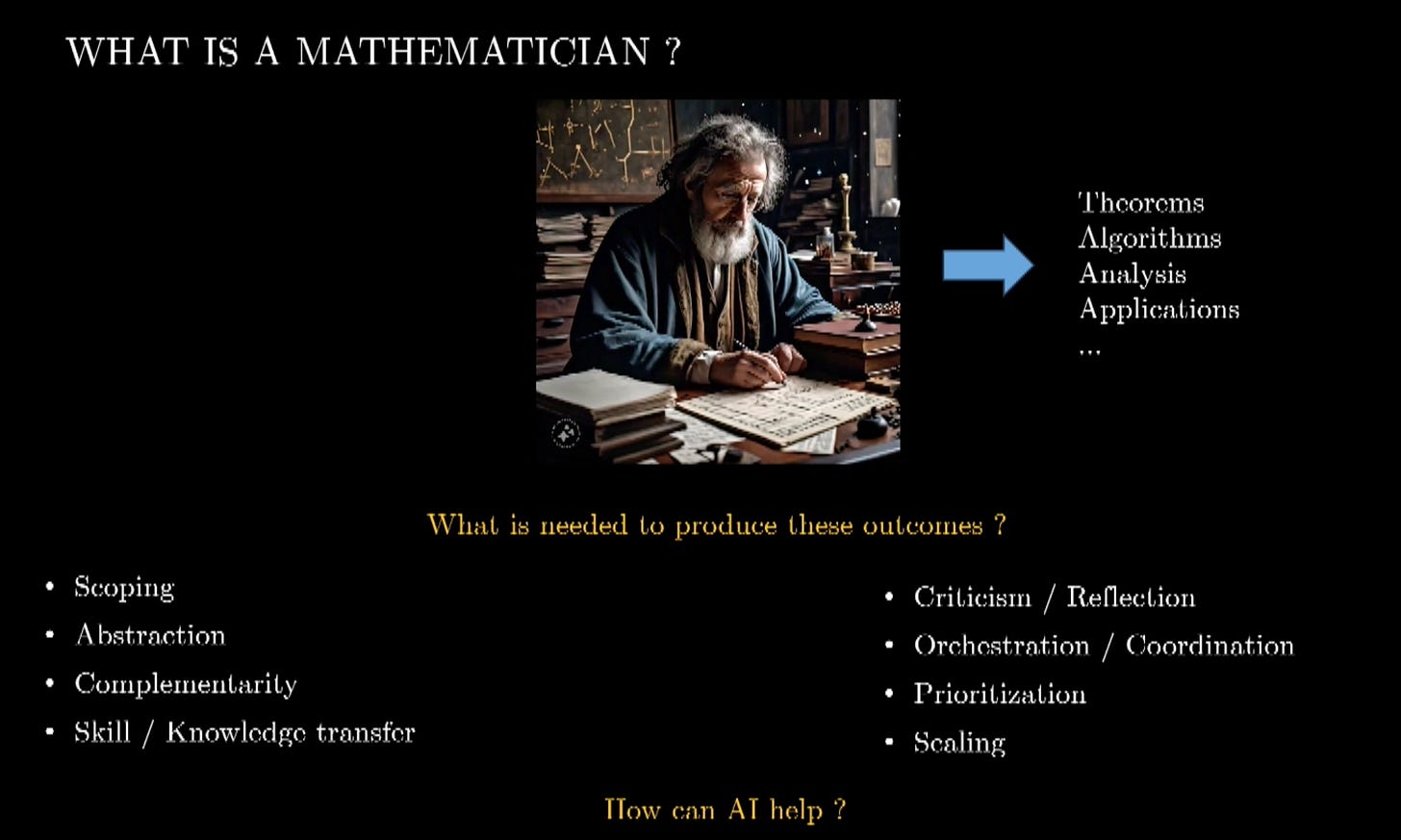
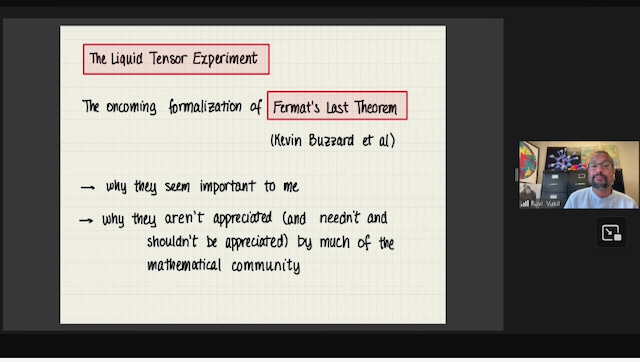
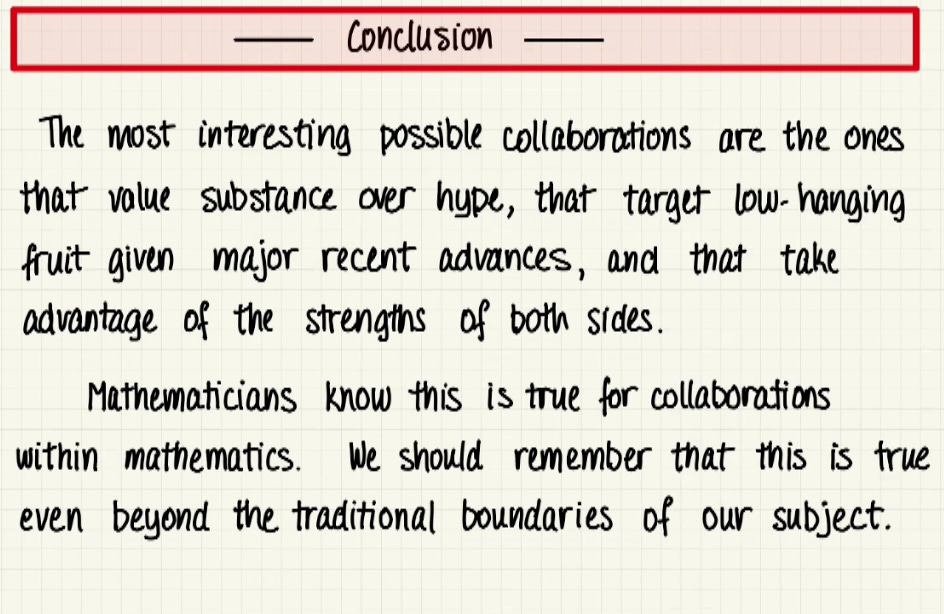
Michael: I read your columns regularly every time, not to agree or disagree or get involved, but to get pleasant or even entertaining relief from unpleasant things of academic life, especially in current depressingly ugly political environment.